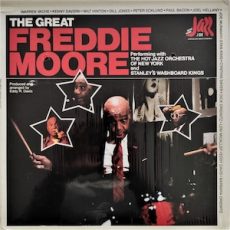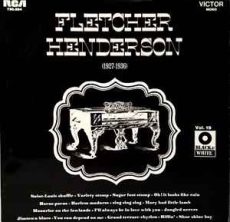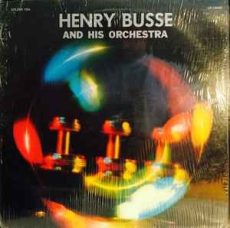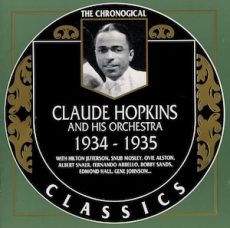
Daily Dose Of Jazz…
Freddie Moore was born on August 20, 1900, in Washington, North Carolina. Here’s some more information about Freddie Moore: He began playing drums in 1912 at the age of 12 and started his career in traveling shows, picking up much experience in variety shows and on vaudeville. He was with Charlie Creath in 1927 in St. Louis, Missouri and recorded with King Oliver from 1929-30, touring with him from 1931-32. He played in New York City with Wilbur Sweatman from 1928-31.
He went on to lead his own band with Peter Brown and Don Frye in Detroit, Michigan from 1933 to 1937. He feelanced for the next 20 years with Sidney Bechet, King Oliver, Art Hodes, Eubie Blake, John Kirby, Bob Wilber and Conrad Janis along with many others. The drummer was with Wilbur DeParis’ New New Orleans Jazz Band from 1952-54 and played in Europe with Mezz Mezzrow from 1954-55. He had associations with Sammy Price, Tony Parenti and even Roy Eldridge in 1971.
In the 1980s and the early 1990s he stayed active, playing with various bands in the New York area and often doubled on washboard. He was a colorful performer, often mugging and adding showbiz effects to the music. Moore, who appeared on a Rahsaan Roland Kirk record playing Sweet Georgia Brown, led his only record date for the New York Jazz label in 1981.
Drummer and singer Freddie Moore, whose long career finally came to an end after seven decades of playing with so many notable musicians, died on November 3, 1992 in New York.

Daily Dose Of Jazz…
Clarence Holiday was born Clarence Halliday on July 23, 1898 in Baltimore, Maryland and attended a boys’ school with the banjo player Elmer Snowden. Both of them played banjo with various local jazz bands, including the Eubie Blake band. At the age of 16, he became the unmarried father of Billie Holiday, who was born to 19-year-old Sarah Fagan, but rarely visited them. He moved to Philadelphia, Pennsylvania when he was 21 years old.
Holiday played rhythm guitar and banjo as a member of the Fletcher Henderson Orchestra from 1928 to 1933. He went on to record the following year with Benny Carter, then Bob Howard in 1935 and worked with Charlie Turner, Louis Metcalf, and the Don Redman Big Band between 193 and 1937.
Exposed to mustard gas while serving in World War I, he later fell ill with a lung disorder while on tour in Texas. Refused treatment at a local hospital when he finally managed to see a doctor, Clarence was only allowed in the Jim Crow ward of the Veterans Hospital. By then pneumonia had set in and without antibiotics, the illness was fatal.
Guitarist and banjoist Clarence Holiday died in Dallas, Texas on March 1, 1937.

Daily Dose Of Jazz…
Frederick L. Guy was born in Burkeville, Virginia on May 23, 1897 and was raised in New York City. He played guitar and banjo with Joseph C. Smith’s Orchestra.
In the early 1920s, Guy joined Duke Ellington’s Washingtonians, switching from banjo to guitar in the early Thirties. He remained with Ellington’s orchestra until 1949.
Retiring from music he moved to Chicago, Illinois and for twenty years ran a ballroom. On December 22, 1971 he committed suicide. He was 74 years old.

Daily Dose Of Jazz…
Henry Busse Sr. was born on May 19, 1894 in Magdeburg, Germany to a generational German Band family. He studied violin and then trumpet after a broken finger was set incorrectly. In 1912 at age 18 he ran away from the family farm outside of Magdeburg, where he had been forced to play trumpet in his uncle’s band.
Initially jumping ship in New York City and landing in the German ghettos there, unable to speak English, he found a job on a boat heading to California. He acquired some English on his trip in 1916 that found him in Hollywood working as an extra in Keystone Cop films and playing trumpet in a movie theater pit band.
In 1917, he played the trumpet with the Frisco Jass Band before forming his own band, Busse’s Buzzards which was the nucleus of the Paul Whiteman orchestra of the mid-1920s, and featuring Henry they made four sides in total. Being the subject of discrimination because of his German accent caused concern among those living in post-World War I America.
At one point, eight out of the top ten sheet music sales spots belonged to the band. During his peak with them, Busse was earning $350 weekly, while fellow band member Bing Crosby was earning just $150. Busse co-composed several of the band’s early hit songs, including Hot Lips with Gussie Mueller and Wang Wang Blues. The latter sold over one million copies, and was awarded a gold disc in 1920.
Throughout the 1920s he was concertmaster for the Whiteman Band, played alongside the Dorsey brothers, Ray Bolger, and formed the Shuffle Rhythm Band, which went on to enjoy great success in the 1930s and ’40s. A later group, The Henry Busse Orchestra. This group was more of a dance band than a jazz band and had a successful career.
Hitting his peak in 1930-45 playing dance music before the war, and swing during the war. He and his band appeared in two MGM color movies in 1935 called Starlit Days at the Lido, filmed at the Ambassador Hotel, along with Clark Gable and the studio’s stable of stars and in the movie Lady Let’s Dance.
Trumpeter Henry Busse and his Orchestra continued to record and perform up until his death on April 23,1955. at an undertaker’s convention at the Peabody Hotel in Memphis, Tennessee. He was playing with the Shuffle Rhythm Band.
More Posts: history,instrumental,jazz,music,trumpet

Daily Dose Of Jazz…
Pete Edward Jacobs was born on May 7, 1899 in Asbury Park, New Jersey. His first professional job was playing with the Musical Aces. He then joined the band of Claude Hopkins from 1926 to 1928.
Leaving Hopkins he joined Charlie Skeete for a short stint but returned to play with Hopkins from 1928 until 1938. During this ten-year tenure in Hopkins’s orchestra, Jacobs recorded extensively with the group on Brunswick Records, during 1932 to 1937.
Additionally, he appeared with the band in the short films Barbershop Blues in 1933) and By Request in 1936.
Falling ill in 1938 he hung up his drummsticks and quit the group, never returning to active performance. Drummer Pete Jacobs, who was prominent during the swing era for about a decade, died in 1952, month and day unknown.
More Posts: drums,history,instrumental,jazz,music



